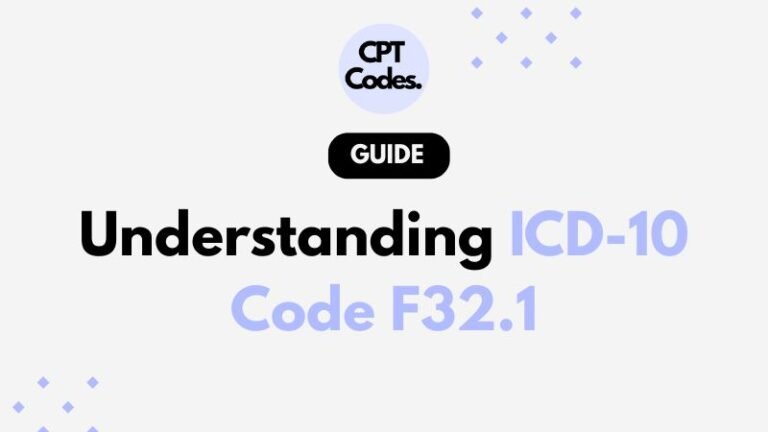Depression is one of the most common mental health conditions worldwide, but not all forms of depression are the same. In clinical settings, healthcare providers use the ICD-10 coding system to classify mental health diagnoses with precision. One such code is ICD-10 F32.1, which specifically refers to Major Depressive Disorder, Single Episode, Moderate.
This article breaks down what ICD-10 F32.1 means, how it’s used in diagnosis and treatment, and why it matters for both patients and healthcare providers.
What Does ICD-10 F32.1 Mean?
The ICD-10 (International Classification of Diseases, 10th Revision) provides a standardized way for doctors, therapists, and insurers to identify health conditions.
-
F32.1 = Major depressive disorder, single episode, moderate.
-
Single episode: The person is experiencing their first major depressive episode.
-
Moderate severity: Symptoms are more disruptive than mild depression but not as overwhelming as severe depression with psychotic features.
This code helps distinguish the type and severity of depression so providers can tailor treatment accordingly.
Symptoms of Moderate Major Depressive Disorder
A diagnosis under ICD-10 F32.1 generally involves several hallmark symptoms, which may include:
- Persistent sadness or low mood
- Loss of interest in activities once enjoyed (anhedonia)
- Changes in appetite or weight
- Sleep problems (insomnia or hypersomnia)
- Fatigue and low energy
- Difficulty concentrating or making decisions
- Feelings of guilt or worthlessness
These symptoms typically last at least two weeks and interfere with daily functioning. While not life-threatening in every case, untreated moderate depression can escalate or become chronic.
Why ICD-10 Coding Matters in Mental Health
Accurate coding, such as using F32.1, serves multiple purposes:
-
Clinical clarity – Providers can quickly communicate the diagnosis across healthcare teams.
-
Insurance and reimbursement – Proper documentation ensures coverage for therapy, medication, or hospitalization.
-
Treatment planning – Identifying severity (mild, moderate, severe) helps guide whether talk therapy, medication, or a combination is most effective.
-
Research and statistics – Data from ICD-10 codes help track the prevalence of conditions like depression across populations.
Treatment Options for F32.1
Managing moderate major depression often involves a multi-layered approach. Common strategies include:
- Psychotherapy: Cognitive Behavioral Therapy (CBT), interpersonal therapy, or supportive counseling.
- Medication: Antidepressants such as SSRIs or SNRIs may be prescribed.
- Lifestyle interventions: Exercise, sleep hygiene, and stress reduction techniques.
- Support systems: Peer support groups, family therapy, and community resources.
- Because this diagnosis specifies “single episode,” treatment also focuses on preventing recurrence through follow-up care and patient education.
ICD-10 F32.1 vs. Other Depression Codes
It’s helpful to understand how F32.1 compares with related ICD-10 codes:
| Code | Description | Key Difference |
|---|---|---|
| F32.0 | Major depressive disorder, single episode, mild | Fewer symptoms, less impact on daily life |
| F32.1 | Major depressive disorder, single episode, moderate | More impairing, but not severe or psychotic |
| F32.2 | Major depressive disorder, single episode, severe, without psychotic features | More intense symptoms, major functional impairment |
| F32.3 | Severe, with psychotic features | Includes hallucinations or delusions |
| F33.x | Major depressive disorder, recurrent | For patients with repeated episodes |
This differentiation helps ensure the most accurate care path.
Living with a Diagnosis of F32.1
For patients, receiving a diagnosis of ICD-10 F32.1 can feel daunting, but it’s also a first step toward healing. Knowing that depression is recognized as a legitimate medical condition helps reduce stigma and encourages people to seek support.
Family members and caregivers can also use this diagnosis to better understand what their loved one is going through and how to provide compassionate support.
Final Takeaway
ICD-10 F32.1 represents Major Depressive Disorder, Single Episode, Moderate. It’s more than just a billing code, it’s a tool for clinicians to provide precise, individualized care. With accurate diagnosis and proper treatment, individuals experiencing moderate depression can manage symptoms and work toward recovery.

